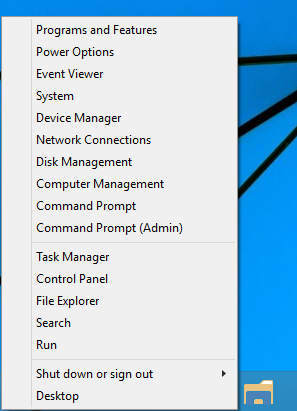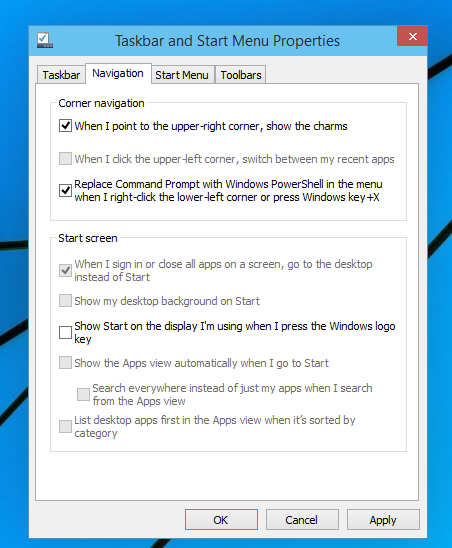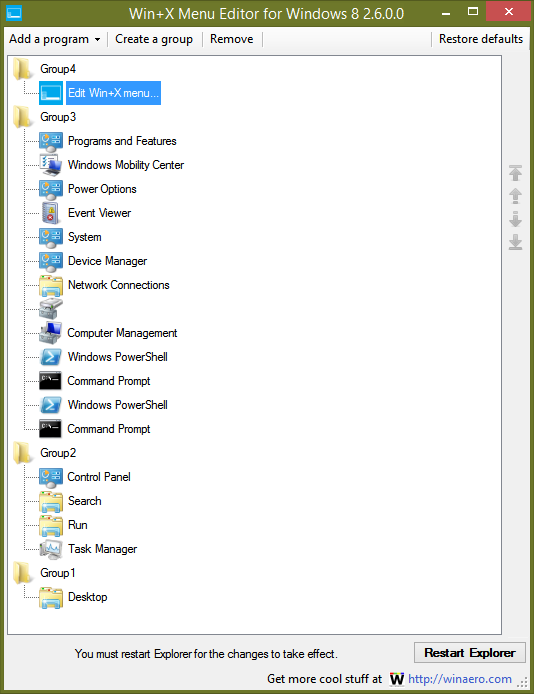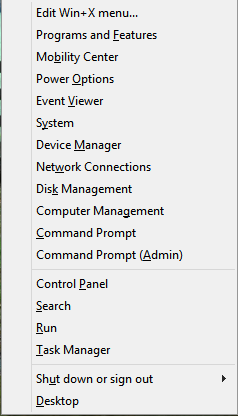In Windows 8, Microsoft introduced a feature for mouse users which can be accessed with a right click on the bottom left corner of the screen - the Win+X menu. In Windows 8.1 and Windows 10, you can simply right click on the Start button to show it. Although this menu is far from being a Start Menu replacement, it does have shortcuts to useful administrative tools and system functions. In this article, we will see how to use and customize this menu in Windows 10.
Advertisеment
To access the Win + X menu in Windows 10, you have two options:
- Right click the Start button. Instead of the context menu of the taskbar, Windows 10 shows Win + X menu.
- Or, press Win + X shortcut keys on the keyboard:

By default, Windows 10 has the following items in the Win+X menu:
- Programs and Features - allows you to uninstall software.
- Power options - opens the power plan and related settings.
- Event viewer - shows the complete list of events on your PC.
- System - shows the system properties window.
- Device Manager - allows managing device and driver settings.
- Network Connections - opens the list of network adapters.
- Disk Management - allows you to manage partitions and hard drives.
- Computer Management - opens a set of various administrative settings, including Disk Management and Event Viewer mentioned above.
- Command Prompt - opens a new command prompt instance.
- Command Prompt (Admin) - opens a new elevated command prompt instance.
- Task Manager - opens the Task Manager. See this article for more information.
- Control Panel - opens the Control Panel.
- File Explorer - opens the File Manager
- Search - launches the Search app.
- Run - opens the Run dialog.
- The shutdown options menu - shows a submenu with Sign out, Reboot and Shutdown.
- Desktop - minimizes all opened windows and shows Desktop.
Replace the command prompt with PowerShell
If you prefer to work with PowerShell instead of the command prompt, you can put PowerShell shortcuts instead of the command prompt using the taskbar properties. Right click the taskbar, open its properties and go to the Navigation tab. Tick the checkbox Replace Command Prompt with Windows PowerShell in the menu when I right-click the lower-left corner or press Windows key+X:
The Win+X menu entries actually are all shortcut files (.LNK) but customizing the Win+X menu is no easy task because Microsoft intentionally made it harder to customize probably to prevent third party apps from abusing it and putting their own shortcuts there. The shortcuts are all special - they are passed though a Windows API hashing function and the hash is then stored inside those shortcuts. Its presence tells the Win+X menu that the shortcut is special and only then it will show up in the menu, otherwise it will be ignored.
To customize the Power user menu, you can use my Win + X Menu editor app. Win+X Menu Editor is a free tool with an easy-to-use GUI to let you customize the Win+X menu. It does not patch any system files to disable the hash check. Using it, you can add or remove shortcuts to the Win+X menu, change their names and order.
- Download Win+X Menu Editor from here.
- The UI is pretty self-explanatory. You can add any program. It has presets for common system tools. You can organize shortcuts in groups and reorder them.
- When you are done editing the menu inside it, click the Restart Explorer button to save changes and restart Explorer.exe.
In this screenshot, you can see a link to Win+X Menu Editor itself added to this menu.
That's it. Am I missing some functionality related to the Win+X Menu? Please let me know in the comments.
Support us
Winaero greatly relies on your support. You can help the site keep bringing you interesting and useful content and software by using these options:

awesome thanks!
You are welcome
This is a great program. I’m using it on Win 10 10074.
Do you plan to add the ability to add Windows apps (Universal, Modern, etc) to the Power User menu? I know they are in C:\\Program Files\WindowsApps, but can’t add the whole container.
Actually, the app I wanted to add was Settings, but not sure that is in with the other apps.
Thanks
Launch settings app via shortcut with the shortcut property:
Target: ms-settings:
Thank you. I noticed that although you can add .cpl items to the menu using your editor, such as intl.cpl, they error “file does not have a program associated with it to perform this action” when clicked on from the menu.
Hi .cpl files can be added with your nice tool but they don’t open from the Win + X menu because there is no program associated with the file to perform the action. Windows 19 anniversary update
This did NOT automatically add itself to the menu and when I added it, it showed up, but clicking on it did not open it, it did nothing. The whole reason I am using this program is to add recent files to the Wix+X menu, which is %AppData%\Microsoft\Windows\Recent\….please help!
Restore Defaults results in an exception and wipes my Win-X power menu leaving me without a power menu at all!
See the end of this message for details on invoking
just-in-time (JIT) debugging instead of this dialog box.
************** Exception Text **************
System.IO.DirectoryNotFoundException: Could not find a part of the path ‘W:\Users\Default\AppData\Local\Microsoft\Windows\WinX’.
at System.IO.__Error.WinIOError(Int32 errorCode, String maybeFullPath)
at System.IO.FileSystemEnumerableIterator`1.CommonInit()
at System.IO.FileSystemEnumerableIterator`1..ctor(String path, String originalUserPath, String searchPattern, SearchOption searchOption, SearchResultHandler`1 resultHandler, Boolean checkHost)
at System.IO.DirectoryInfo.InternalGetFiles(String searchPattern, SearchOption searchOption)
at QCd-9cl{43!jYj9gS0a?`3<\&\&.(DirectoryInfo , DirectoryInfo )
at QCd-9cl{43!jYj9gS0a?`3<\&\&.(Object , EventArgs )
at System.Windows.Forms.ToolStripItem.RaiseEvent(Object key, EventArgs e)
at System.Windows.Forms.ToolStripButton.OnClick(EventArgs e)
at System.Windows.Forms.ToolStripItem.HandleClick(EventArgs e)
at System.Windows.Forms.ToolStripItem.HandleMouseUp(MouseEventArgs e)
at System.Windows.Forms.ToolStrip.OnMouseUp(MouseEventArgs mea)
at System.Windows.Forms.Control.WmMouseUp(Message& m, MouseButtons button, Int32 clicks)
at System.Windows.Forms.Control.WndProc(Message& m)
at System.Windows.Forms.ToolStrip.WndProc(Message& m)
at System.Windows.Forms.NativeWindow.Callback(IntPtr hWnd, Int32 msg, IntPtr wparam, IntPtr lparam)
************** Loaded Assemblies **************
mscorlib
Assembly Version: 4.0.0.0
Win32 Version: 4.8.3928.0 built by: NET48REL1
CodeBase: file:///C:/Windows/Microsoft.NET/Framework64/v4.0.30319/mscorlib.dll
—————————————-
WinXEditor
Assembly Version: 3.0.0.0
Win32 Version: 3.0.0.0
CodeBase: file:///C:/Users/nlerner/Downloads/WinXMenuEditorRelease%20(1)/WinXEditor.exe
—————————————-
System.Windows.Forms
Assembly Version: 4.0.0.0
Win32 Version: 4.8.3928.0 built by: NET48REL1
CodeBase: file:///C:/WINDOWS/Microsoft.Net/assembly/GAC_MSIL/System.Windows.Forms/v4.0_4.0.0.0__b77a5c561934e089/System.Windows.Forms.dll
—————————————-
System
Assembly Version: 4.0.0.0
Win32 Version: 4.8.3928.0 built by: NET48REL1
CodeBase: file:///C:/WINDOWS/Microsoft.Net/assembly/GAC_MSIL/System/v4.0_4.0.0.0__b77a5c561934e089/System.dll
—————————————-
System.Drawing
Assembly Version: 4.0.0.0
Win32 Version: 4.8.3761.0 built by: NET48REL1
CodeBase: file:///C:/WINDOWS/Microsoft.Net/assembly/GAC_MSIL/System.Drawing/v4.0_4.0.0.0__b03f5f7f11d50a3a/System.Drawing.dll
—————————————-
System.Configuration
Assembly Version: 4.0.0.0
Win32 Version: 4.8.3761.0 built by: NET48REL1
CodeBase: file:///C:/WINDOWS/Microsoft.Net/assembly/GAC_MSIL/System.Configuration/v4.0_4.0.0.0__b03f5f7f11d50a3a/System.Configuration.dll
—————————————-
System.Core
Assembly Version: 4.0.0.0
Win32 Version: 4.8.3928.0 built by: NET48REL1
CodeBase: file:///C:/WINDOWS/Microsoft.Net/assembly/GAC_MSIL/System.Core/v4.0_4.0.0.0__b77a5c561934e089/System.Core.dll
—————————————-
System.Xml
Assembly Version: 4.0.0.0
Win32 Version: 4.8.3761.0 built by: NET48REL1
CodeBase: file:///C:/WINDOWS/Microsoft.Net/assembly/GAC_MSIL/System.Xml/v4.0_4.0.0.0__b77a5c561934e089/System.Xml.dll
—————————————-
System.Data
Assembly Version: 4.0.0.0
Win32 Version: 4.8.3761.0 built by: NET48REL1
CodeBase: file:///C:/WINDOWS/Microsoft.Net/assembly/GAC_64/System.Data/v4.0_4.0.0.0__b77a5c561934e089/System.Data.dll
—————————————-
System.Numerics
Assembly Version: 4.0.0.0
Win32 Version: 4.8.3761.0 built by: NET48REL1
CodeBase: file:///C:/WINDOWS/Microsoft.Net/assembly/GAC_MSIL/System.Numerics/v4.0_4.0.0.0__b77a5c561934e089/System.Numerics.dll
—————————————-
Microsoft.CSharp
Assembly Version: 4.0.0.0
Win32 Version: 4.8.3761.0
CodeBase: file:///C:/WINDOWS/Microsoft.Net/assembly/GAC_MSIL/Microsoft.CSharp/v4.0_4.0.0.0__b03f5f7f11d50a3a/Microsoft.CSharp.dll
—————————————-
System.Dynamic
Assembly Version: 4.0.0.0
Win32 Version: 4.8.3761.0
CodeBase: file:///C:/WINDOWS/Microsoft.Net/assembly/GAC_MSIL/System.Dynamic/v4.0_4.0.0.0__b03f5f7f11d50a3a/System.Dynamic.dll
—————————————-
Anonymously Hosted DynamicMethods Assembly
Assembly Version: 0.0.0.0
Win32 Version: 4.8.3928.0 built by: NET48REL1
CodeBase: file:///C:/WINDOWS/Microsoft.Net/assembly/GAC_64/mscorlib/v4.0_4.0.0.0__b77a5c561934e089/mscorlib.dll
—————————————-
************** JIT Debugging **************
To enable just-in-time (JIT) debugging, the .config file for this
application or computer (machine.config) must have the
jitDebugging value set in the system.windows.forms section.
The application must also be compiled with debugging
enabled.
For example:
When JIT debugging is enabled, any unhandled exception
will be sent to the JIT debugger registered on the computer
rather than be handled by this dialog box.
thank you